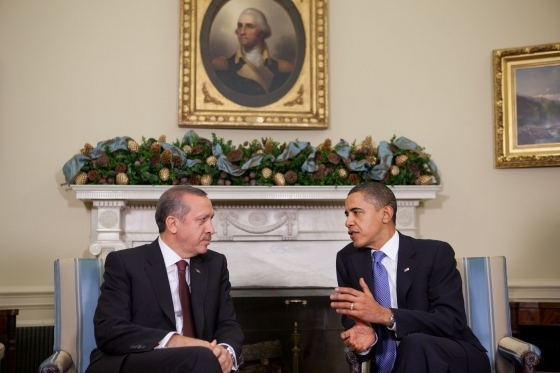UPDATES
Is Turkey flipping Democracy the bird?
May 23, 2012 | Ahron Shapiro

While many in the international media have recently “coronated” Israeli Prime Minister Binyamin Netanyahu as “King” of Israel following his formation of a national unity government, surely the use of the term, with its non-democratic connotations, would be more apropos when referring to Turkey’s Prime Minister Recep Erdogan.
Erdogan truly has been consolidating his power in non-democratic ways, silencing his critics, and taking steps that are moving his country further and further away from democracy.
Writing in the New York Times earlier this month, foreign correspondent Andrew Finkel, whose expertise on Turkey spans two decades, warned that Erdogan appears to be taking advantage of a parliamentary drive for constitutional reforms to pave the way to expand his powers in a newly created, more powerful presidential role.
As a result of Erdogan’s efforts, discussion over the shape of the future of Turkey under a new Constitution will be hijacked by a debate over the future of just one man. Unfortunately, all of this is a distraction from the real issue of how to make Turkey’s government more representative.
At the moment Erdogan resembles a Moses wandering in the desert: having led his people from one sort of bondage, he is unable to lead them to the promised land. If he believes so strongly that Turkey should have a presidential system, then he first needs to declare that he is not a candidate.
Also, in Commentary Magazine, Michael Rubin illustrates how Erdogan has targeted his opponents. In the case of the Turkish military, which has been seen by the West as a bulwark against anti-Israel and anti-Western sentiment in Turkish policy, Erdogan has jailed no less than 20% of all his generals in a more or less transparent effort to intimidate his critics.
The Turkish press is reporting that, with the latest round of arrests of former military officers for allegedly forcing the resignation of Necmettin Erbakan’s Islamist government in 1997, one-in-five Turkish generals is now in prison.
Even those who see the end of military influence in Turkey as the litmus test for democracy should worry. Prime Minister Recep Tayyip Erdoğan now targets political opponents, real or imagined, without restraint. Under the Turkish system, an accusation is enough to jail an opponent, sometimes for years without trial. There is no mechanism for bail. On its surface, the targeting of the generals is ridiculous: The Turkish Supreme Court affirmed the illegality of the Erbakan and disbanded his party for violating Turkey’s constitution. The European Court of Human Rights upheld the Turkish court’s actions. Turkish generals might have pursued unsavory actions-especially toward Turkey’s Kurdish minority-but the sheer number of those now in prison suggests a separate motivation.
Meanwhile, Barry Rubin, the Director of the Global Research and International Affairs (GLORIA) Center, has written a recent column about how Erdogan’s ambitions for Turkey to emerge as the power broker in the new Middle East has alienated the very Sunni Muslim Arabs he hoped to lead.
“The increasingly power-drunk behavior of Turkish leaders may go unnoticed by a worshipful Obama, who touts the “Turkish model,” but the Arabs have been alienated by such attitudes. Having also threatened Israel, Greece, and Cyprus, while partly antagonizing Iran – though the Ankara regime continues to break trade sanctions with Tehran, sabotage totally accepted by the pliant Obama administration – the Turkish leaders have destroyed their own foreign policy. While this regime began with a realistic chance of being everyone’s friend, it has now made itself everyone’s enemy.
Meanwhile, Turkey was the origin of a couple of strange stories in recent news that raised questions by some observers over whether Ankara is still playing with a full deck.
This week, the Israeli Foreign Ministry denied an outlandish report in the Turkish media that claimed that Israel planned to station 20,000 “commandos” in Cyprus to protect 10,000 Israelis who they claimed would relocate to Cyprus in order to take part in joint development of natural gas resources. (Israel has never stationed troops abroad and certainly could not spare 20,000 soldiers, more than a tenth of Israel’s entire standing army).
It is assumed the Turkish report was an attempt to embarrass the Cypriots by creating the impression that Nicosia is depending on Israeli military support in order to harvest its offshore gas resources. Turkey disputes Cyprus’ claims over certain offshore drilling sites, which Turkey says falls within the jurisdiction of Turkish-controlled Northern Cyprus.
Elsewhere in Turkey, the carcass of a bird that had been found with a Israeli band around its leg raised suspicions among the Turks that Israel was using the bird for surveillance.
According to the story, the Turks believed the band – a ubiquitous method of tracking migratory patterns for scientific research – was a tip-off that the Mossad had recruited the winged creature for espionage. The Turkish authorities alleged the bird’s nostril was unusually large and could have housed a recording device.
The corpse was impounded for further study.
Ahron Shapiro
Tags: Turkey











